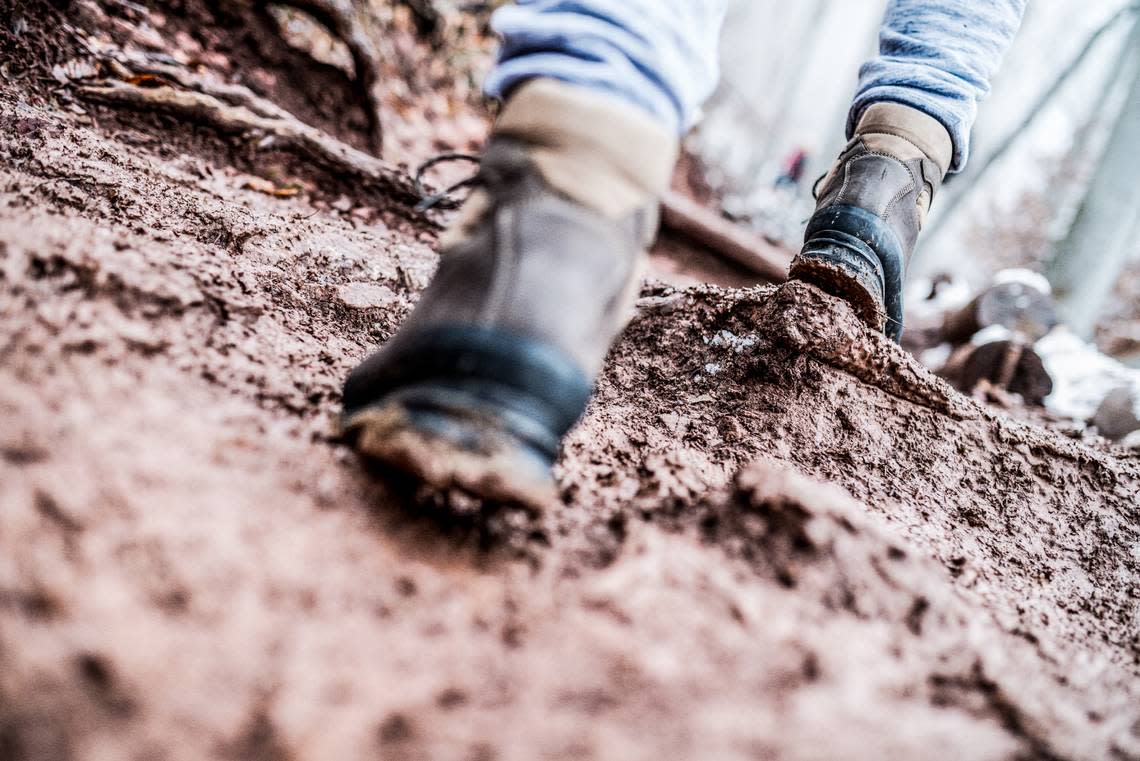Injured hiker carried 7 hours on steep and frigid trail, New Hampshire officials say

Rescuers carried a 31-year-old injured hiker for seven hours along a rainy, frigid and steep trail in northern New Hampshire, wildlife officials said.
The man from Oakland, California, was hiking the Huntington Ravine Trail alone on Oct. 17, the New Hampshire Fish and Game Department said in news release.
At about 5:20 p.m., he called 911 after he slipped on the “steep, wet rock slab” and fell off the trail, officials said. He injured his leg and head during the fall.
“(The man) was not prepared for a hike of this caliber and did not possess the necessary gear to hike the toughest trail in the White Mountains,” wildlife officials said in the release.
Rescuers reached the injured hiker at about 9 p.m. and made a plan to carry him along the trail instead of hoisting him up it with ropes, officials said.
They began carrying him about two hours later. The trek to safety took another seven hours with 22 rescuers navigating “rough conditions” and steep terrain, officials said.
The hiker was transported to an ATV the next day at 6:15 a.m., which took him down the trail to a visitor center where he was met with an ambulance, officials said.
The Huntington Ravine Trail is a nearly 8-mile loop hike with an elevation gain of 4,265 feet, according to AllTrails.
Officials said the challenging hike should not be done by inexperienced hikers who don’t know how to rock climb or use ropes and harnesses.
It also shouldn’t be completed during rainy conditions because it requires scrambling and climbing steep rocks, the outdoor app said.
“Signs have been posted at both the lower and upper entrances to this trail in an effort to dissuade casual hikers from attempting this hike,” officials said.
How to be prepared while hiking
If you’re planning to hike, the National Park Service says there are 10 essentials you should take:
Navigation: Pack a map, compass and a GPS system. Make sure you study your route beforehand and understand how to use the tools.
Sun protection: Sunglasses, sunscreen and a hat can help protect your skin and eyes from UV rays.
Insulation: A jacket, hat, gloves, raincoat and thermal underwear can help you be prepared for rapidly changing weather conditions.
Illumination: A flashlight, lantern and headlamp can create light if you get stuck in the dark — and don’t forget to pack extra batteries.
First-aid supplies: It’s a good idea to have a first-aid kit on hand while hiking. Check the expiration date on items before you pack them.
Fire: Matches and a lighter can help start fire to act as an emergency signal in times of need.
Repair kit and tools: Duct tape, a knife, screwdriver and scissors can be helpful if items break during your hike or you need assistance.
Nutrition: You should pack an extra day’s worth of food in case something goes wrong. Park officials recommend having “salty and easy to digest snacks.”
Hydration: You should drink water often and before you feel thirsty if you’re hiking in hot weather. Keeping your body hydrated is “of utmost importance,” park officials said.
Emergency shelter: Packing a tent, space blanket, tarp and bivy can help you be prepared if severe weather breaks out or your plan takes a turn.
Missing hiker stranded overnight after texting friends he was lost on Hawaii trail
72-year-old slips and slides 50 feet onto ‘steep and unstable’ ground, CA rescuers say
Hikers end up lost on cold, dark and rainy trail without flashlights or map, cops say

